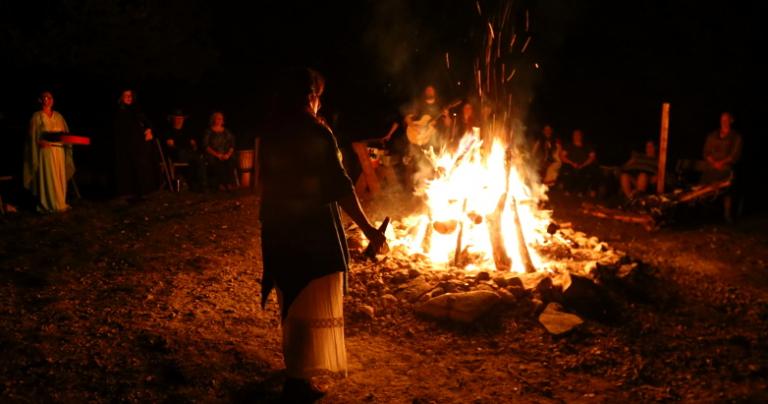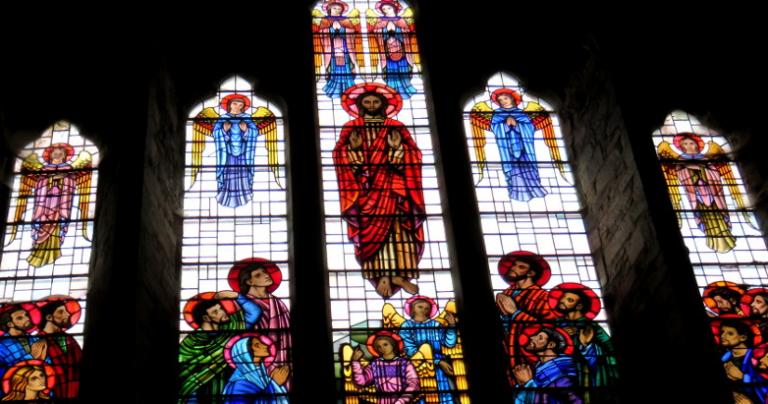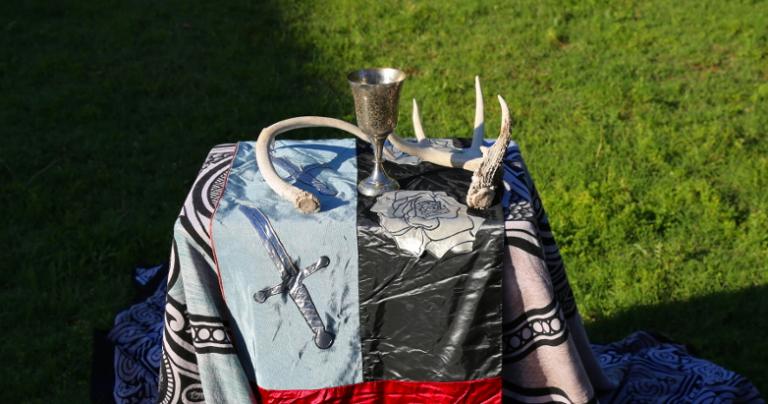As a Pagan how do you feel about angels? I always feel conflicted personally as they don’t fit in with the Druidry I practice – it feels like trying to Christianise an earth based religion.
I have to answer that question on two levels.
I believe angels exist. They’re part of the religious environment of the ancient Near East and are attested to in countless encounters over the centuries. As a polytheist, I need not deny the religious beings and structures of other religions just because I don’t worship them in mine.
Angels are part of the magical tradition that gave rise to the modern Pagan movement, and they’ve carried over into some Pagan practices. And of course, they’re very popular in New Age circles.
But as a Pagan of Celtic heritage and calling, I choose not to work with angels. They’re not part of my Druid tradition and as I pointed out in the question above about religious trauma, I needed to make a clean break with Christianity.
I reject all attempts to combine and conflate angels with the fae and other Otherworldly beings of the Northwest European traditions. That erases the uniqueness and dignity of the fae (something I don’t advise doing under any circumstances).
So are angels real? Of course. Do I work with them in my own practice? No. Others must make their own decisions, but my strong preference is to keep Paganism as Pagan as possible.
All of the Pagan mythologies that I’m aware of, especially the European ones, have a strong emphasis upon heroic individuals. How does one use these stories to help develop communities of belonging when most of them don’t focus on communal life?
I encourage you to go back and read those stories again. Yes, they emphasize the mighty deeds of heroic individuals. But why were they attempting these deeds in the first place? Usually, it was to defend their homes and their people, and to raise the standing of their kith and kin.
Cormac wanted the Silver Branch to keep peace at his court. When he realized he had traded his family for it, he went in search of them. Lugh, the Dadga, the Morrigan, and many others fought mightily so they could secure Ireland from the Fomorians. Bran had his head cut off so he could continue conversing with his compatriots, and when he finally fell silent it was buried on the White Hill to ward off invasions.
Ancient communities needed heroic individuals to do the heroic things that made community possible. Our contemporary communities do too.
How do we handle leadership transitions in Pagan churches so that those who have given service feel valued and those who want to serve are listened to?
Your use of the term “Pagan churches” outs you as an ADF member. I agree with the ADF founders’ goal of creating a Pagan religious institution, but I wish they had found a different term for it. Or, in the spirit of the RDNA, if they had made one up.
Whether we call our Pagan religious institutions churches or orders or just groups, the question of leadership transition is valid and important. And it’s one that I’m personally involved with. Last year I stepped away from formal leadership in Denton CUUPS after 12 years as Coordinating Officer. I gave the membership six months’ notice that I wasn’t going to run for a 13th term and that I wasn’t going to hand-pick my successor. So far so good.
Leadership can be a thankless task. Ordinary members sometimes (often) don’t recognize the huge amount of work necessary to keep a group up and running. That’s even more true in a large organization like ADF, where most members never see the Mother Grove (the Board of Directors) and only speak up when the leaders do something the members don’t like… and in any group above coven size any decision is going to rub some people the wrong way. Leaders need thick skins and a commitment to a vision for the group strong enough to sustain them when the inevitable criticism comes.
There is no substitute for a shared vision. If we agree on where we want to go, then even passionate disagreements over how to get there can end with everyone supporting the group’s decisions. With a shared vision, new members know exactly what they’re joining, and those who don’t like that vision know they’ll be happier in a different group.
Some highly progressive groups (some religious, some political) like to say “we’re all about process” – they think that by emphasizing consensus and the democratic process, everyone will feel like they’ve been heard and feel like they’re valued. While we should listen to everyone, the unifying effect of being heard can’t hold a candle to the unifying effect of a shared vision.
This is true in organizations of all sizes, whether you’re as small as Denton CUUPS or as large as ADF… or if you’re as large as a major American political party…
There are many ways to handle the mechanics of leadership transition – pick the one that’s right for your group. But transitions are far more pleasant and far more effective when both the outgoing and incoming leaders are part of a shared vision for the group.

When you travel on pilgrimage, do you give offerings or prayers to spirits of the road or travel spirits of any kinds? If so, how do you do so?
You’re the first person who’s ever mentioned travel spirits or spirits of the road to me. So, no – but I very well may do so in the future.
Before I leave, I pray and make offerings to the Gods and spirits I’m allied with, asking for safe and timely travels, for protection for my home while I’m gone, and that my experience on the journey be what it needs to be.
When I arrive in a new land, I make offerings to the spirits of the place. I introduce myself and ask for safe passage through the land. I do the same when I’m visiting sacred sites. Usually I offer water – since it’s what I’m carrying – though for special occasions I’ll get a small bottle of whiskey or mead. If I go to a place where votive offerings are appropriate I always offer an American coin or two – a tangible connection from my land to the land I’m visiting.
And then I offer prayers and offerings of thanksgiving when I get home.
Why do well-studied Pagans dismiss those who have found Paganism through experiences and meditative introspection/exterior forces? I know it’s difficult to explain how I know X or Y to be true to someone because I found it in the void or inside but why am I “less” for that? It took me about 2 years to even come to understanding of what I see of the under-workings of the world. It’s really hard to engage in those discussions when faced with immediate judgement. I don’t pretend to be an expert or anything.
Speculating about other people’s motivation is always difficult. But in general I see two reasons.
One is that academically inclined Pagans tend to have a bias for academic sources. They favor known history and lore, and research that meets rigorous standards. There’s certainly nothing wrong with that, so long as it doesn’t cause them to dismiss other sources… but sometimes it does.
The second reason is that there is still so much garbage passing for factual information (and not just in Paganism, but that’s the topic of this conversation). After you hear “the Morrigan is a Sex Goddess” for the eighteenth time, you tend to be skeptical of any claims that aren’t in alignment with tradition and lore.
Earlier this week Angelo Nasios had a very good post on Agora titled Hearth of Hellenism: Personal Gnosis and Tradition. He linked to a post I wrote in 2015 The Lore vs. UPG – A False Dichotomy. Both of these posts make a similar argument – a healthy religion needs both lore and personal gnosis. Or as Angelo put it in his piece
When UPG is the sole guiding principle for someone without any cultural context, that is appropriation and it is damaging to the cultural source from which the gods are expressed in … When we side ourselves too far on tradition and lore we run the risk of killing the tradition in the long run because we fossilize the tradition.
The task at hand is to know the tradition as best as we can so we can make sense of UPG in the most effective way that is meaningful to the individual without altering tradition with every new experience.
The comments to Aine Llewellyn’s question on theological disagreements also apply here. Honest questions and challenges are good for our religious integrity. Being rude or dismissive is not.
And finally, Kenneth Isles asks “How can I support your work? Only thru Patheos? Do you have a direct way to contribute?”
Thanks for asking – I appreciate the support.
I have no direct way to contribute – I don’t have a Patreon or anything like that. My paying job covers the mortgage and other ordinary expenses. That’s good, but it means I don’t have time to create special content for patrons.
The best way to support my work is to read it and share it. Facebook shares don’t go nearly as far as they used to (Facebook is trying to keep readers on their site as long as possible) but I still get about 30% of my traffic through them. It used to be 50%. I’m also on Twitter, Google+, and MeWe. Shares there help too, particularly if you have a large Twitter following. Commenting on the Facebook posts helps – the more interaction, the more people Facebook will show it to. But only if you have something to say.
Sign up for e-mail notifications and/or the Patheos Pagan Newsletter in the box on the right side of the screen. You can’t count on Facebook letting you know when I update.
Buy my book! I do better if you order The Path of Paganism directly from Llewellyn (Amazon is not kind to authors), but buying it anywhere helps. If you like it, leave a review on Amazon, Goodreads, or other book sites.
And remember that not all support is financial. This blog has always been part of a larger project in modern Paganism. Read what I write, then try it and see if it works for you. If it helps, let me know. If it doesn’t, let me know that too. I have many ideas, but I don’t have all the answers. Feedback helps me – and all of us – build a stronger and more robust Paganism.
Thanks to everyone who made it all the way to the end! We’ll do it again next month.


















